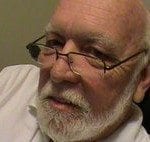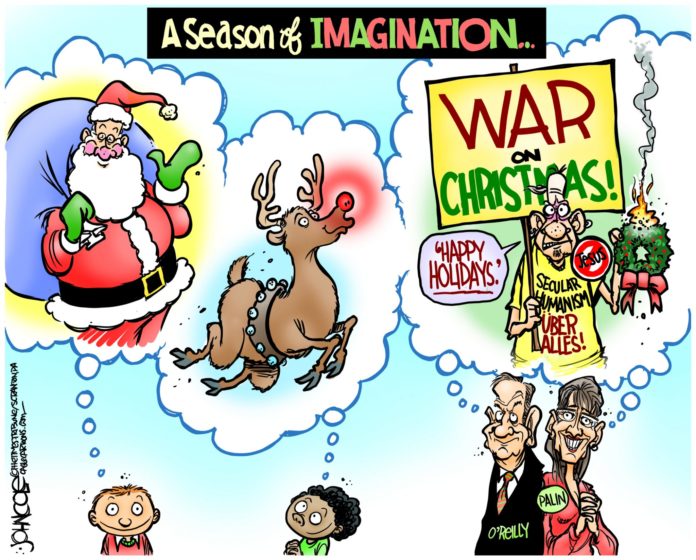BY RICHARD L. FRICKER
 Most everyone in the contiguous 48 states, the provinces and territories of Canada have been gob smacked with true winter in these first few days of December. As the temperature drops to single digits, snow days declared and Mrs. Fricker rearranges and cleans Rancho Fricardo in preparation for Yuletide, one is left to ponder the season [not exactly, for there are constant calls for aid in rearranging items which appear to be out of place].
Most everyone in the contiguous 48 states, the provinces and territories of Canada have been gob smacked with true winter in these first few days of December. As the temperature drops to single digits, snow days declared and Mrs. Fricker rearranges and cleans Rancho Fricardo in preparation for Yuletide, one is left to ponder the season [not exactly, for there are constant calls for aid in rearranging items which appear to be out of place].
This year’s pondering, as in previous years, has taken on the form of a quest: seeking out the “War on Christmas.” Where is this “War on Christmas?”
While there have been notices on Facebook, declarations by politicians and assertions by various ministers of varying ilks, no one seems able to point to just who is causing this “war” and what it actually is.
It wasn’t too long ago, before the age of the Tea Party and evangelical Taliban, that over-commercialism was consider the enemy of the true spirit of Christmas. Whatever happened to those foes of Christmas commercialism? Were they replaced by Saints Walton and Koch?
Have Nazareth and Bethlehem been replaced by Wichita and Bentonville?
And have Melchior, Caspar and Balthazar been replaced by Ryan, Cantor and Cruz? It would be difficult to imagine the latter three on camels.
But still where is the “war?” Now some people prefer to be all-inclusive and say “Seasons Greetings” instead of “Merry Christmas.” Is that what people are calling a war?
First of all, it is a “season.” And for historical purposes, the most important event of the season is the Solstice. The Solstice meant a lot more to the medieval farmer and traveler than how he was greeted on the street.
Historically, for Christians, Easter was the big day of the liturgical year, Christmas was the beginning of the year. The December 25th day is a commemoration of an event, not the anniversary.
If the people harping to put the “Christ” back in Christmas had their way, we would all be in a caravan following a star to the Koch family home in Wichita while the Walton family levitated over Bentonville to hear the workers singing at the cash registers. And the McDonalds’ people would be herding the faithful past the drive-thru as they picked up Christmas Big Macs and double fries.
But if it’s really the true spirit of Christian teaching you seek, you might want to drop by the Tulsa State Fairgrounds in a few days and join the thousands – sometimes 10,000 bikers of various stripe – as they join hundreds of thousands of other riders across America to donate to Toys for Tots. It would be a very bad idea to suggest to any one of these that they do not have the Christmas spirit. Even a pencil-thin accountant is not to be trifled with when in their leathers – regardless of gender or age!
All across this country churches have been presenting lessons and carols in anticipation of Christmas. Groups from the Catholic Knights of Columbus to Protestant men’s clubs and service organizations have been collecting donations of food and clothing for the less fortunate, in preparation for Christmas.
If you want to find the Christian spirit at work all year round, just look for people such as Josh Martin and his fellows at Boston Avenue Methodist Church. Martin has an auto repair shop and became involved with Car Care Clinic a handful of years ago. He and his crew of volunteers give hundreds of hours of free labor to keep the cars of the poorest running so they can get to their jobs as they try to earn a living. Yes, they are at war – with poverty, just like so many other volunteers in this country.
While considering if there is a war on Christmas, one might also consider that it really isn’t the Christmas season until Christmas Eve. The real Christmas season extends from then until Jan. 6 – the Feast of Epiphany. We are currently in the season of Advent.
The difference between Advent and the Christmas season was explained recently by Frank Fuller PhD, who in addition to being a retired college professor writes liturgy for the Episcopal Diocese in Louisiana.
Dr. Fuller told a congregation, “In some ways, it is possible to say that our church year comes from a calendar of two seasons, Christmas and Easter. Each season is preceded by a period of solemn preparation; each is followed by a period of contemplation. Just as Lent is the preparation for Easter, Advent, the first season of the church year, is the preparation for Christmas.”
Advent is a Latin translation from the Greek parousia – “coming” in English. In our liturgy, Advent leads us to celebrate both the birth of Jesus at Christmas and Christ’s second coming [the parousia] in the future. Hence, the four Sundays of the Advent season are a period of penitential expectation: expectation of Jesus’ birth and Christ’s return.
The Sundays through Advent are marked by four candles, one more lighted each Sunday, and sometimes an Advent calendar that helps mark each of the days until Christmas with prayer, meditation, and offering.
The sometimes somber occasion of this penitential season, however, is lightened on the third Sunday, called Gaudete Sunday, when the pink Advent candle is lighted. Gaudete is “Rejoice!” in Latin.
The readings through the summer described God’s love, judgment, and promise to humankind through the words of the prophets. The readings of Advent tell of that promise, fulfilled in Christ’s coming. The anticipation of the parousia in the Gospel from Matthew reads: “Jesus said to his disciples, ‘About that day and hour no one knows neither the angels of heaven, nor the Son, but only the Father.’” [24:36]
Since the 8th Century, yearning and rejoicing in Advent have been described in the hymn O Come, O Come Emmanual, a text based on Isaiah’s prophesy, in 7:14, of the sign Immanual [God with us]. That hymn comprises the antiphons of each of the days of the week before Christmas.
Christmas is more than parades with band kid’s lips freezing to their horns and nubile majorettes kicking bare legs into the frigid air as fur-coated politicians ride by on horseback. These events would be the same no matter what seasonal name were attached. It wouldn’t matter; Christmas, Parade of Lights, WinterFest they would have the same people.
There is no war on Christmas!
There are politicians and ideologues who claim there is a war. The hope is people will believe an oft-repeated myth rather than their own eyes. People in fear can be manipulated.
– Richard L. Fricker lives in Tulsa, OK and is a regular contributor to The Oklahoma Observer. His latest book, The Last Day of the War, is available at https://www.createspace.com/3804081 or at www.richardfricker.com.








